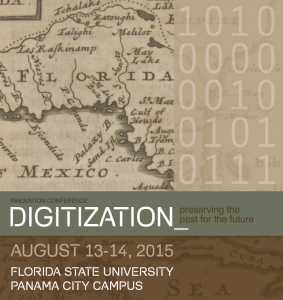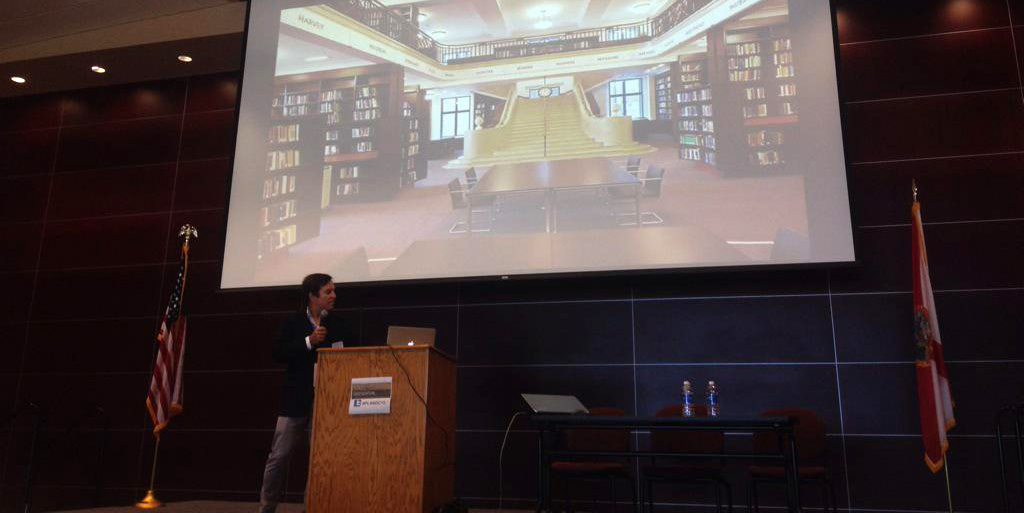 For many of us, it was Panama City Beach or bust as nearly 100 information professionals convened at the Digitization Conference, hosted by the Panhandle Library Access Network (PLAN) at Florida State University. The conference was packed with invigorating speakers from LYRASIS, DPLA, the State Library of Florida, George Blood Audio LP, Penn State, ResCarta, Florida State University, Florida International University, Dominican University, Florida Atlantic University and the University of Florida. Topics included how to plan a project, create a collection development policy, copyright law for digitization and digitized objects, metadata and meta metadata, and how we can future-proof digital collections. The conference attendees represented special libraries, museums, archives, public and academic libraries.
For many of us, it was Panama City Beach or bust as nearly 100 information professionals convened at the Digitization Conference, hosted by the Panhandle Library Access Network (PLAN) at Florida State University. The conference was packed with invigorating speakers from LYRASIS, DPLA, the State Library of Florida, George Blood Audio LP, Penn State, ResCarta, Florida State University, Florida International University, Dominican University, Florida Atlantic University and the University of Florida. Topics included how to plan a project, create a collection development policy, copyright law for digitization and digitized objects, metadata and meta metadata, and how we can future-proof digital collections. The conference attendees represented special libraries, museums, archives, public and academic libraries.
As the opening keynote speaker, Robert Miller, the new CEO of LYRASIS, asked the audience, “How many of you have done a digitization project?” Many hands went up. He followed with, “Would you consider yourself an expert?” Some hands went down. As the day progressed, however, it was evident that we had many experts, both as speakers and attendees. For one participant, the conference “provided not only the opportunity to network with other professionals who are going through digitization efforts in their own institutions, but also for those of us who have been doing this for some time.”
We heard many stories of digitization and plenty of discussions about planning or how to begin. Many came to the conference seeking advice. They know they have some interesting, unique and rare collections just waiting for the chance to be digitized. Some had concerns that certain formats are becoming extinct and it’s only a matter of time before we lose a huge history about ourselves, our communities and what makes a lot of our collections so unique. They proudly spoke in all sessions about their projects, their woes turned into success stories, tales of how they were a “David” in a “Goliath” digitization world. Robert Miller pointed out many examples, including the Allen County Public Library in Indiana where the public library, not larger institutions like the Library of Congress, took on digitizing and housing the repository for the Lincoln Collection. This was best handled by those who were closest to the collection – themselves!
As a balance to the number of digitization experts attending, it seemed there were just as many newcomers to digitization eager to hear the experts. One participant stated, “as a newcomer to the subject [digitization], I found the conference to be excellent. It was accessible on many levels, from beginners to veterans.” Another participant shared with us that they are starting at ground zero for their digitization project and that this conference was a great help, “the speakers–and even more importantly–the contacts I made during the conference were invaluable. I left with a clear, actionable sense of what I needed to do to make my library’s digitization project a success.”

It was indeed exciting to hear about the different types of digitization projects around the room and what were the pressing topics that lead them to come to this conference. The Navy Experimental Dive Unit, which has an extensive collection of scientific testing reports on humans in diving experiments, came to learn how to begin a project and had lots of questions on how to prepare the metadata. The Calcasieu Parish Public Library has a unique collection of voter registration cards in fairly good condition that are ready to be digitized from the 1930s-40s. These projects, though considered “small” could become part of larger efforts like the Florida Memory Project or DPLA, thus feeding and keeping the larger scale projects out there alive and nourished.
Probably one of the best pieces of advice, provided during a session by LYRASIS’s Tom Clareson, was this “R and D is not Research and Development, it’s rip off and duplicate. Let’s not reinvent the wheel.” We are in this together. Listen to others’ stories of digitization, seek similar projects and give those who have already done digital work a call. Collaborate and share experiences, provide support to each other as we all embark on many continuing digital projects.
In closing, PLAN’s Executive Director, Charles Mayberry, stated, “Our conference was highly successful thanks to the leadership and support provided by Amy Johnson, the State Librarian of Florida, and the generous participation of LYRASIS. PLAN enjoyed overwhelmingly positive feedback from the conference attendees, including a number of requests for another conference next year. And we are looking forward to next year!”
We here at LYRASIS are looking forward to next year’s conference as well. Stay tuned for updates and future conference details.
